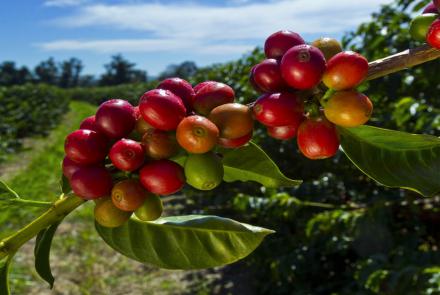COFFEE GROWING AREAS IN EAST AFRICA.
Exploring the Rich Coffee Growing Regions of East Africa
Coffee is cultivated around the globe, but some of the best beans come from regions located along the equator between the Tropic of Cancer and the Tropic of Capricorn, where the humid climate and balanced rainfall provide the ideal conditions for coffee cultivation. East Africa is home to some of the most famous coffee-growing countries, each offering a distinct flavor profile, from fruity and floral undertones to bright acidity and complex body.
Coffee in Uganda: Robusta and Arabica at High and Low Altitudes
In Uganda, coffee is grown in various regions across the country, with two primary types of coffee: Robusta and Arabica. Robusta coffee is typically grown in the lower altitudes of central, eastern, southeastern, and western Uganda, thriving at elevations up to 1,200 meters above sea level. This region’s warm temperatures and abundant rainfall create ideal conditions for Robusta coffee production.
On the other hand, Arabica coffee is grown in the highland areas of Mount Elgon in the east and Mount Rwenzori in the west. The Arabica coffee in these regions was introduced from Ethiopia and has since naturalized along the slopes of Mount Elgon, benefiting from the cooler temperatures and fertile volcanic soil. The result is a rich, well-balanced cup of coffee with a mild acidity and floral notes.
Arabica and Robusta Coffee in Tanzania: A Blend of Flavors
Tanzania is another prominent coffee producer in East Africa, with Arabica coffee making up approximately 70% of the country's total coffee production, and the remaining 30% being Robusta. Arabica coffee is primarily grown in the northern Kilimanjaro and Meru areas, as well as in the Mbeya, Matengo Highlands, and Mbinga regions. In contrast, Robusta coffee is grown mainly in the Bukoba area of the Kagera Region, where the climate is better suited for this variety.
Coffee from Tanzania is known for its bright acidity, medium body, and fruity undertones, especially those grown in the southern regions of the country. These beans often have a complex flavor profile that makes them a favorite among coffee enthusiasts worldwide.
Rwanda: Small-Scale Arabica Coffee Farms and High-Quality Beans
Coffee in Rwanda was introduced at the beginning of the 20th century and is grown mainly by small-scale farmers, with an estimated 500,000 farmers cultivating coffee across the country. The Rwandan coffee-growing regions, such as Kivu, Muhazi, Akagera, Kizi Rift, and Virunga, are known for producing high-quality Arabica coffee.
Other coffee-growing areas in Rwanda include Butare, Byumba, Gisenyi, Kigali-Ngali, Gitarama, Kibungo, Kibuye, Cyangugu, and Gikongoro. These regions are renowned for their ideal growing conditions, which include volcanic soils, consistent rainfall, and high altitudes ranging between 4,000 and 6,500 feet above sea level. These factors contribute to the production of rich, flavorful coffee beans with complex aromas and a vibrant cup profile.
Burundi: High-Quality Coffee from Volcanic Soil
In Burundi, approximately 600,000 to 800,000 families are involved in coffee production, according to The World Bank’s 2011 report on Africa. Burundi’s favorable volcanic soil and abundant rainfall (around 1,200 mm per year) create an ideal environment for coffee cultivation. Volcanic soils are rich in essential nutrients like nitrogen, which is crucial for coffee plants.
Burundi has five major coffee-producing regions: Buyenzi (which includes the Kayanza and Ngozi provinces), Kirimiro, Mumirwa, Bweru, and Bugesera. These regions are known for their high-quality coffee beans and rich flavor profiles. Arabica coffee is the dominant variety in Burundi, benefiting from the country's favorable temperatures, which range between 14°C to 26°C, although it can tolerate up to 30°C.
Why East African Coffee Stands Out
The coffee-growing regions of East Africa offer a diverse range of flavors, from the bright and fruity profiles of Tanzanian coffee to the floral and acidic notes of Rwandan and Ugandan Arabica. With volcanic soil, ideal climates, and smallholder farming traditions, East African coffee stands out for its unique characteristics and high quality. Whether you're enjoying a Tanzanian Arabica or a Burundian Arabica with its complex flavors, East Africa provides some of the best coffee beans in the world.
Conclusion: Discover the Richness of East African Coffee
If you are a coffee enthusiast looking for bold, complex flavors, East African coffee is a must-try. The region's diversity of coffee-growing regions, combined with the rich soil and perfect climate conditions, results in coffee that is rich in flavor and history. From the Robusta and Arabica beans of Uganda to the vibrant coffees of Tanzania, Rwanda, and Burundi, East Africa offers an unforgettable coffee experience that will enrich your cup and broaden your coffee palate.


